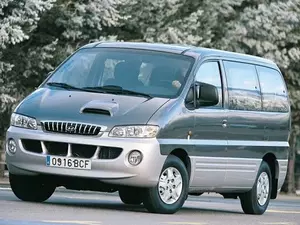
| Vehicle | Precise engine size | Difference from world average | Engine size to consumption ratio | Horsepower from 1 L | Engine size to 100 kg of weight |
|---|---|---|---|---|---|
| 2.5 D |
2.5 L (2497 cc) |
6.4% bigger | 109 cc to 1 mpg | 70 hp from 1 L | 100 cc to 100 kg |
| Vehicle | 2.5 D |
|---|---|
| Precise engine size | 2.5 L (2497 cc) |
| Difference from world average | 6.4 bigger |
| Engine size to consumption ratio | 109 cc to 1 mpg |
| Horsepower from 1 L | 70 hp from 1 L |
| Engine size to 100 kg of weight | 100 cc to 100 kg |

| Vehicle | Precise engine size | Difference from world average | Engine size to consumption ratio | Horsepower from 1 L | Engine size to 100 kg of weight |
|---|---|---|---|---|---|
| 2.5 CRDi |
2.5 L (2497 cc) |
6.4% bigger | 89 cc to 1 mpg | 46 hp from 1 L | 109 cc to 100 kg |
| Vehicle | 2.5 CRDi |
|---|---|
| Precise engine size | 2.5 L (2497 cc) |
| Difference from world average | 6.4 bigger |
| Engine size to consumption ratio | 89 cc to 1 mpg |
| Horsepower from 1 L | 46 hp from 1 L |
| Engine size to 100 kg of weight | 109 cc to 100 kg |

| Vehicle | Precise engine size | Difference from world average | Engine size to consumption ratio | Horsepower from 1 L | Engine size to 100 kg of weight |
|---|---|---|---|---|---|
| 2.5 CRDi |
2.5 L (2497 cc) |
6.4% bigger | 92 cc to 1 mpg | 68 hp from 1 L | 119 cc to 100 kg |
| Vehicle | 2.5 CRDi |
|---|---|
| Precise engine size | 2.5 L (2497 cc) |
| Difference from world average | 6.4 bigger |
| Engine size to consumption ratio | 92 cc to 1 mpg |
| Horsepower from 1 L | 68 hp from 1 L |
| Engine size to 100 kg of weight | 119 cc to 100 kg |

| Vehicle | Precise engine size | Difference from world average | Engine size to consumption ratio | Horsepower from 1 L | Engine size to 100 kg of weight |
|---|---|---|---|---|---|
| 2.5 TCi |
2.48 L (2476 cc) |
5.5% bigger | - | 41 hp from 1 L | - |
| 2.4 MPI |
2.36 L (2359 cc) |
0.6% bigger | - | 72 hp from 1 L | - |
| Vehicle | 2.5 TCi |
|---|---|
| Precise engine size | 2.48 L (2476 cc) |
| Difference from world average | 5.5 bigger |
| Engine size to consumption ratio | - |
| Horsepower from 1 L | 41 hp from 1 L |
| Engine size to 100 kg of weight | - |
| Vehicle | 2.4 MPI |
| Precise engine size | 2.36 L (2359 cc) |
| Difference from world average | 0.6 bigger |
| Engine size to consumption ratio | - |
| Horsepower from 1 L | 72 hp from 1 L |
| Engine size to 100 kg of weight | - |

| Vehicle | Precise engine size | Difference from world average | Engine size to consumption ratio | Horsepower from 1 L | Engine size to 100 kg of weight |
|---|---|---|---|---|---|
| 2.5 CRDi |
2.5 L (2497 cc) |
6.4% bigger | - | 68 hp from 1 L | - |
| Vehicle | 2.5 CRDi |
|---|---|
| Precise engine size | 2.5 L (2497 cc) |
| Difference from world average | 6.4 bigger |
| Engine size to consumption ratio | - |
| Horsepower from 1 L | 68 hp from 1 L |
| Engine size to 100 kg of weight | - |

| Vehicle | Precise engine size | Difference from world average | Engine size to consumption ratio | Horsepower from 1 L | Engine size to 100 kg of weight |
|---|---|---|---|---|---|
| 2.5 CRDi |
2.5 L (2497 cc) |
6.4% bigger | 81 cc to 1 mpg | 46 hp from 1 L | 119 cc to 100 kg |
| Vehicle | 2.5 CRDi |
|---|---|
| Precise engine size | 2.5 L (2497 cc) |
| Difference from world average | 6.4 bigger |
| Engine size to consumption ratio | 81 cc to 1 mpg |
| Horsepower from 1 L | 46 hp from 1 L |
| Engine size to 100 kg of weight | 119 cc to 100 kg |

| Vehicle | Precise engine size | Difference from world average | Engine size to consumption ratio | Horsepower from 1 L | Engine size to 100 kg of weight |
|---|---|---|---|---|---|
| 2.5 CRDi |
2.5 L (2497 cc) |
6.4% bigger | 81 cc to 1 mpg | 46 hp from 1 L | 114 cc to 100 kg |
| Vehicle | 2.5 CRDi |
|---|---|
| Precise engine size | 2.5 L (2497 cc) |
| Difference from world average | 6.4 bigger |
| Engine size to consumption ratio | 81 cc to 1 mpg |
| Horsepower from 1 L | 46 hp from 1 L |
| Engine size to 100 kg of weight | 114 cc to 100 kg |

| Vehicle | Precise engine size | Difference from world average | Engine size to consumption ratio | Horsepower from 1 L | Engine size to 100 kg of weight |
|---|---|---|---|---|---|
| 2.5 CRDI |
2.5 L (2497 cc) |
6.4% bigger | 92 cc to 1 mpg | 56 hp from 1 L | 131 cc to 100 kg |
| 2.5 TD |
2.48 L (2476 cc) |
5.5% bigger | 103 cc to 1 mpg | 40 hp from 1 L | 130 cc to 100 kg |
| 2.4 |
2.35 L (2351 cc) |
0.2% bigger | - | 48 hp from 1 L | 131 cc to 100 kg |
| 2.4 i 16V 4WD SWB |
2.35 L (2351 cc) |
0.2% bigger | - | 57 hp from 1 L | 131 cc to 100 kg |
| 2.4 i 4WD |
2.35 L (2351 cc) |
0.2% bigger | - | 47 hp from 1 L | 118 cc to 100 kg |
| 2.4 i 16V LWB |
2.48 L (2476 cc) |
5.5% bigger | - | 54 hp from 1 L | 138 cc to 100 kg |
| 2.4 i LWD |
2.35 L (2351 cc) |
0.2% bigger | - | 47 hp from 1 L | 131 cc to 100 kg |
| 2.5 CRDI LWB |
2.5 L (2497 cc) |
6.4% bigger | 92 cc to 1 mpg | 56 hp from 1 L | 131 cc to 100 kg |
| 2.5 TD 4WD SWB |
2.48 L (2476 cc) |
5.5% bigger | - | 41 hp from 1 L | 138 cc to 100 kg |
| 2.5 TD LWB |
2.48 L (2476 cc) |
5.5% bigger | - | 41 hp from 1 L | 138 cc to 100 kg |
| Vehicle | 2.5 CRDI |
|---|---|
| Precise engine size | 2.5 L (2497 cc) |
| Difference from world average | 6.4 bigger |
| Engine size to consumption ratio | 92 cc to 1 mpg |
| Horsepower from 1 L | 56 hp from 1 L |
| Engine size to 100 kg of weight | 131 cc to 100 kg |
| Vehicle | 2.5 TD |
| Precise engine size | 2.48 L (2476 cc) |
| Difference from world average | 5.5 bigger |
| Engine size to consumption ratio | 103 cc to 1 mpg |
| Horsepower from 1 L | 40 hp from 1 L |
| Engine size to 100 kg of weight | 130 cc to 100 kg |
| Vehicle | 2.4 |
| Precise engine size | 2.35 L (2351 cc) |
| Difference from world average | 0.2 bigger |
| Engine size to consumption ratio | - |
| Horsepower from 1 L | 48 hp from 1 L |
| Engine size to 100 kg of weight | 131 cc to 100 kg |
| Vehicle | 2.4 i 16V 4WD SWB |
| Precise engine size | 2.35 L (2351 cc) |
| Difference from world average | 0.2 bigger |
| Engine size to consumption ratio | - |
| Horsepower from 1 L | 57 hp from 1 L |
| Engine size to 100 kg of weight | 131 cc to 100 kg |
| Vehicle | 2.4 i 4WD |
| Precise engine size | 2.35 L (2351 cc) |
| Difference from world average | 0.2 bigger |
| Engine size to consumption ratio | - |
| Horsepower from 1 L | 47 hp from 1 L |
| Engine size to 100 kg of weight | 118 cc to 100 kg |
| Vehicle | 2.4 i 16V LWB |
| Precise engine size | 2.48 L (2476 cc) |
| Difference from world average | 5.5 bigger |
| Engine size to consumption ratio | - |
| Horsepower from 1 L | 54 hp from 1 L |
| Engine size to 100 kg of weight | 138 cc to 100 kg |
| Vehicle | 2.4 i LWD |
| Precise engine size | 2.35 L (2351 cc) |
| Difference from world average | 0.2 bigger |
| Engine size to consumption ratio | - |
| Horsepower from 1 L | 47 hp from 1 L |
| Engine size to 100 kg of weight | 131 cc to 100 kg |
| Vehicle | 2.5 CRDI LWB |
| Precise engine size | 2.5 L (2497 cc) |
| Difference from world average | 6.4 bigger |
| Engine size to consumption ratio | 92 cc to 1 mpg |
| Horsepower from 1 L | 56 hp from 1 L |
| Engine size to 100 kg of weight | 131 cc to 100 kg |
| Vehicle | 2.5 TD 4WD SWB |
| Precise engine size | 2.48 L (2476 cc) |
| Difference from world average | 5.5 bigger |
| Engine size to consumption ratio | - |
| Horsepower from 1 L | 41 hp from 1 L |
| Engine size to 100 kg of weight | 138 cc to 100 kg |
| Vehicle | 2.5 TD LWB |
| Precise engine size | 2.48 L (2476 cc) |
| Difference from world average | 5.5 bigger |
| Engine size to consumption ratio | - |
| Horsepower from 1 L | 41 hp from 1 L |
| Engine size to 100 kg of weight | 138 cc to 100 kg |